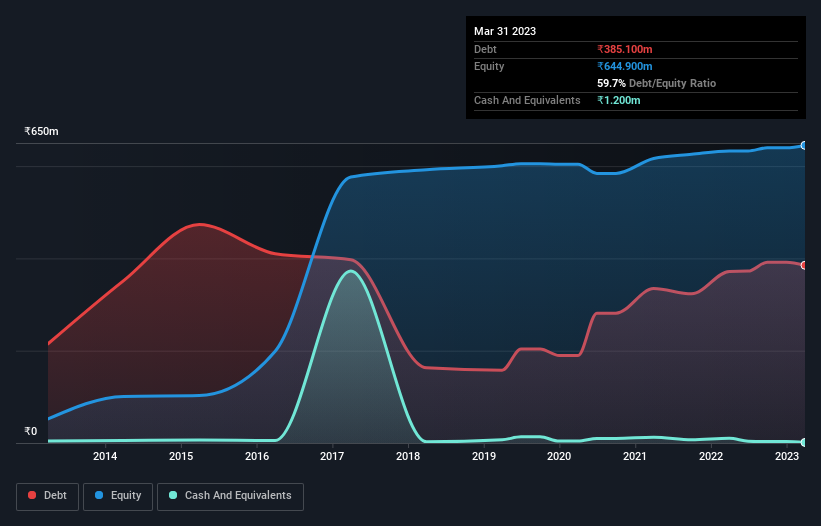We Think Euro India Fresh Foods (NSE:EIFFL) Is Taking Some Risk With Its Debt

David Iben put it well when he said, 'Volatility is not a risk we care about. What we care about is avoiding the permanent loss of capital.' It's only natural to consider a company's balance sheet when you examine how risky it is, since debt is often involved when a business collapses. Importantly, Euro India Fresh Foods Limited (NSE:EIFFL) does carry debt. But the real question is whether this debt is making the company risky.
What Risk Does Debt Bring?
Debt is a tool to help businesses grow, but if a business is incapable of paying off its lenders, then it exists at their mercy. Part and parcel of capitalism is the process of 'creative destruction' where failed businesses are mercilessly liquidated by their bankers. However, a more common (but still painful) scenario is that it has to raise new equity capital at a low price, thus permanently diluting shareholders. Of course, plenty of companies use debt to fund growth, without any negative consequences. When we examine debt levels, we first consider both cash and debt levels, together.
See our latest analysis for Euro India Fresh Foods
What Is Euro India Fresh Foods's Debt?
The chart below, which you can click on for greater detail, shows that Euro India Fresh Foods had ₹385.1m in debt in March 2023; about the same as the year before. Net debt is about the same, since the it doesn't have much cash.

How Healthy Is Euro India Fresh Foods' Balance Sheet?
We can see from the most recent balance sheet that Euro India Fresh Foods had liabilities of ₹432.0m falling due within a year, and liabilities of ₹143.5m due beyond that. Offsetting these obligations, it had cash of ₹1.20m as well as receivables valued at ₹225.1m due within 12 months. So its liabilities total ₹349.2m more than the combination of its cash and short-term receivables.
Given Euro India Fresh Foods has a market capitalization of ₹4.52b, it's hard to believe these liabilities pose much threat. Having said that, it's clear that we should continue to monitor its balance sheet, lest it change for the worse.
In order to size up a company's debt relative to its earnings, we calculate its net debt divided by its earnings before interest, tax, depreciation, and amortization (EBITDA) and its earnings before interest and tax (EBIT) divided by its interest expense (its interest cover). This way, we consider both the absolute quantum of the debt, as well as the interest rates paid on it.
While Euro India Fresh Foods's debt to EBITDA ratio (4.8) suggests that it uses some debt, its interest cover is very weak, at 1.5, suggesting high leverage. It seems clear that the cost of borrowing money is negatively impacting returns for shareholders, of late. Fortunately, Euro India Fresh Foods grew its EBIT by 2.4% in the last year, slowly shrinking its debt relative to earnings. The balance sheet is clearly the area to focus on when you are analysing debt. But it is Euro India Fresh Foods's earnings that will influence how the balance sheet holds up in the future. So if you're keen to discover more about its earnings, it might be worth checking out this graph of its long term earnings trend.
Finally, a company can only pay off debt with cold hard cash, not accounting profits. So the logical step is to look at the proportion of that EBIT that is matched by actual free cash flow. Over the last three years, Euro India Fresh Foods reported free cash flow worth 18% of its EBIT, which is really quite low. That limp level of cash conversion undermines its ability to manage and pay down debt.
Our View
Both Euro India Fresh Foods's interest cover and its net debt to EBITDA were discouraging. At least its level of total liabilities gives us reason to be optimistic. Taking the abovementioned factors together we do think Euro India Fresh Foods's debt poses some risks to the business. While that debt can boost returns, we think the company has enough leverage now. There's no doubt that we learn most about debt from the balance sheet. However, not all investment risk resides within the balance sheet - far from it. Be aware that Euro India Fresh Foods is showing 2 warning signs in our investment analysis , and 1 of those can't be ignored...
If, after all that, you're more interested in a fast growing company with a rock-solid balance sheet, then check out our list of net cash growth stocks without delay.
Valuation is complex, but we're here to simplify it.
Discover if Euro India Fresh Foods might be undervalued or overvalued with our detailed analysis, featuring fair value estimates, potential risks, dividends, insider trades, and its financial condition.
Access Free AnalysisHave feedback on this article? Concerned about the content? Get in touch with us directly. Alternatively, email editorial-team (at) simplywallst.com.
This article by Simply Wall St is general in nature. We provide commentary based on historical data and analyst forecasts only using an unbiased methodology and our articles are not intended to be financial advice. It does not constitute a recommendation to buy or sell any stock, and does not take account of your objectives, or your financial situation. We aim to bring you long-term focused analysis driven by fundamental data. Note that our analysis may not factor in the latest price-sensitive company announcements or qualitative material. Simply Wall St has no position in any stocks mentioned.
About NSEI:EIFFL
Euro India Fresh Foods
Engages in the manufacture and sale of packaged snacks and fruit beverages products under the Euro brand name in India.
Mediocre balance sheet with questionable track record.
Market Insights
Community Narratives



